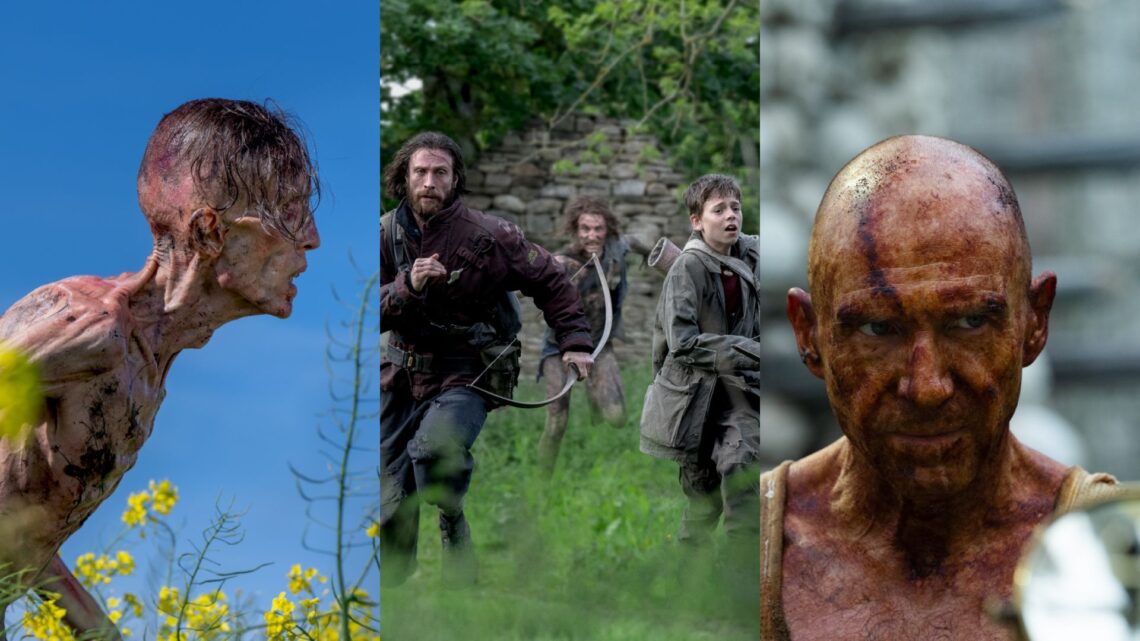Throughout the decades, since the dawn of cinema, moviegoers have been fascinated with the undead. Whether it’s from the horrors of playing God in “Frankenstein” to “Night of the Living Dead”, where the modern concept of zombies was born, Hollywood has found interesting ways to spin the narrative about the deceased in bold new ways. However, no franchise has had fans in a frenzy like “28 Days Later”, an unsettling 2002 movie that resonated worldwide and became the cornerstone of many zombie movies today. The film was a massive success and was greenlit for a sequel, which manifested in the form of “28 Weeks Later”.
Now, 18 years since the second installment, we once again revisit post-zombie apocalypse Great Britain to witness what has unfolded in “28 Years Later”. Starring Jodie Comer, Aaron Taylor-Johnson, Alfie Williams, and Ralph Fiennes, this film dives deep into the lives of people who survived the resurgence of the Rage Virus, as well as life in the mainland. With returning director Danny Boyle and scriptwriter Alex Garland, this film has been hyped up to be the heart-pounding zombie horror film that we all need right now, but does it meet expectations?

The story kicks off on a small island away from the mainland, where some portion of human civilisation now resides. Amongst this tight-knit community of farmers and tinkerers are Spike (played by Alfie Williams) and his father, Jamie (Aaron Taylor-Johnson), who are tasked with venturing beyond their walls as a rite of passage. In their hunt, they’ve encountered various horrors, wonders, death and life.
“28 Years Later” is an interesting film, to say the least. It is still filled with those endless escalations of tension and bloody good jump scares, with an added twist of more surrealism as well as comedy. It is a wildly different and experimental take on the franchise that some may find endearing, while most will find it weird.

First things first – is the horror aspect of the film effective? Incredibly so. The film has greatly reflected upon its previous installments and features a much more unapologetic escalation of tension — it does not care how uncomfortable you, get because that’s the whole point. Every slow and painful build-up does this film a massive service, as viewers are used to zombies by now, so it relies heavily on the elements of surprise and speed. The film will leave you in the dark, often literally, so it can slowly creep under your skin, which results in an effective scare-fest.
There are only a handful of moments where we feel comfortable and relaxed in the film. But you know these calmer scenes are about to end when the cinematography becomes incredibly frantic and jumps from camera to camera. This is, again, in service to the ever-escalating tension the film is trying to impress upon you.

Though this installment is grander in scale, it is far more intimate than its predecessors. Every second of the film is used to build a far more cohesive narrative between the survivors, regardless of whether they are resting for the night or on the run. It is this piece of humanity that recent zombie movies, even horror movies in general, tend to forget. It is this take that allows the jokes and gags thrown in the film to actually work, as well as the ultimate climax to shine – to the point that some audience members are moved to tears. Because of this, “28 Years Later” is without a doubt the most hopeful and uplifting entry in the franchise so far.
If we are to describe the film in two words, it would be “beautifully stressful”. The latter is understandable, but the former isn’t, especially for one as disturbingly gory as this. This is because the movie takes us on an almost magical journey during its more subdued scenes, making us temporarily forget that this is a horror movie. Though they are plenty jarring, it’s these moments that push the characters to grow more as a human beings, which we are totally here for!

However, it is also one of the weirdest entries in the zombie genre. Many scenes in the first act of the film have been spliced with scenes of older films. In hindsight, this meshing of films is often used to hint at something far more political, but it is incredibly jarring upon first watch, yet believe us when we say that’s one of the more tamer aspects of this film.
There’s one particular scene that makes us scratch our heads, but we can’t discuss it, as it is a massive spoiler. Yet, we are confident that you’ll know what we mean when you watch the movie for yourself. Before heading into theatres, note that, in lore, the infected are technically still alive and they have never been considered dead. That may not make sense, but that has been an extremely sensitive topic for filmmakers ever since the first zombie film, so it’s best to keep it in mind when watching this entry or its sequels.

The reason why we are so confident that there’s going to be a sequel to “28 Years Later” is one of this film’s major weak points – it does NOT have a proper ending. That’s right, the movie ends on a cliffhanger. Throughout the film, you’ll find yourself wondering what this film is really about. “28 Days Later” talked about the spread of the infection throughout the country; “28 Weeks Later” was about how the virus was initially contained only for it to break out and totally ravage the country. “28 Years Later” tries to explore what happens to survivors, but does so half-heartedly; it actually hurts the film. Rather than being a cohesive “zombie” narrative with an intriguing family drama, it is instead a “zombie” prequel with some elements of family drama and mystery, neither of which are resolved.
Though it doesn’t outright say it, the words “to be continued” are written all over the film’s ending. This is, sometimes, fine, but we’re pretty sure that many viewers are going to have some issues with the ending: an action sequence filled with jittery camera movements all to the tune of a remixed kids’ show song. If you don’t believe us, we invite you to watch the film and see for yourself.

Overall, “28 Years Later” is a divisive entry into the storied franchise that is as head-scratching as it is absurdist. The film opens with an intense scene that establishes how life in Great Britain is holding up years after the initial spread of the virus, and ends with the most out-of-place cliffhanger to ever be featured in cinema. If you are a fan of the franchise, it is still an interesting watch, but we do implore you to lower your expectations.

“28 Years Later” is currently showing in cinemas nationwide.
The Review
28 Years Later
Overall, “28 Years Later” is a divisive entry into the storied franchise that is as head-scratching as it is absurdist. The film opened with an intense scene that established how life in Great Britain is holding up years after the initial spread of the virus and ended with the most out-of-place cliffhanger to have ever graced cinema. If you are a fan of the franchise, it is still an interesting watch, but we do implore you to lower your expectations.
Review Breakdown
- 28 Years Later










